Charles E W Bean, Diaries, AWM38 3DRL 606/66/1 - November 1916 - Part 2
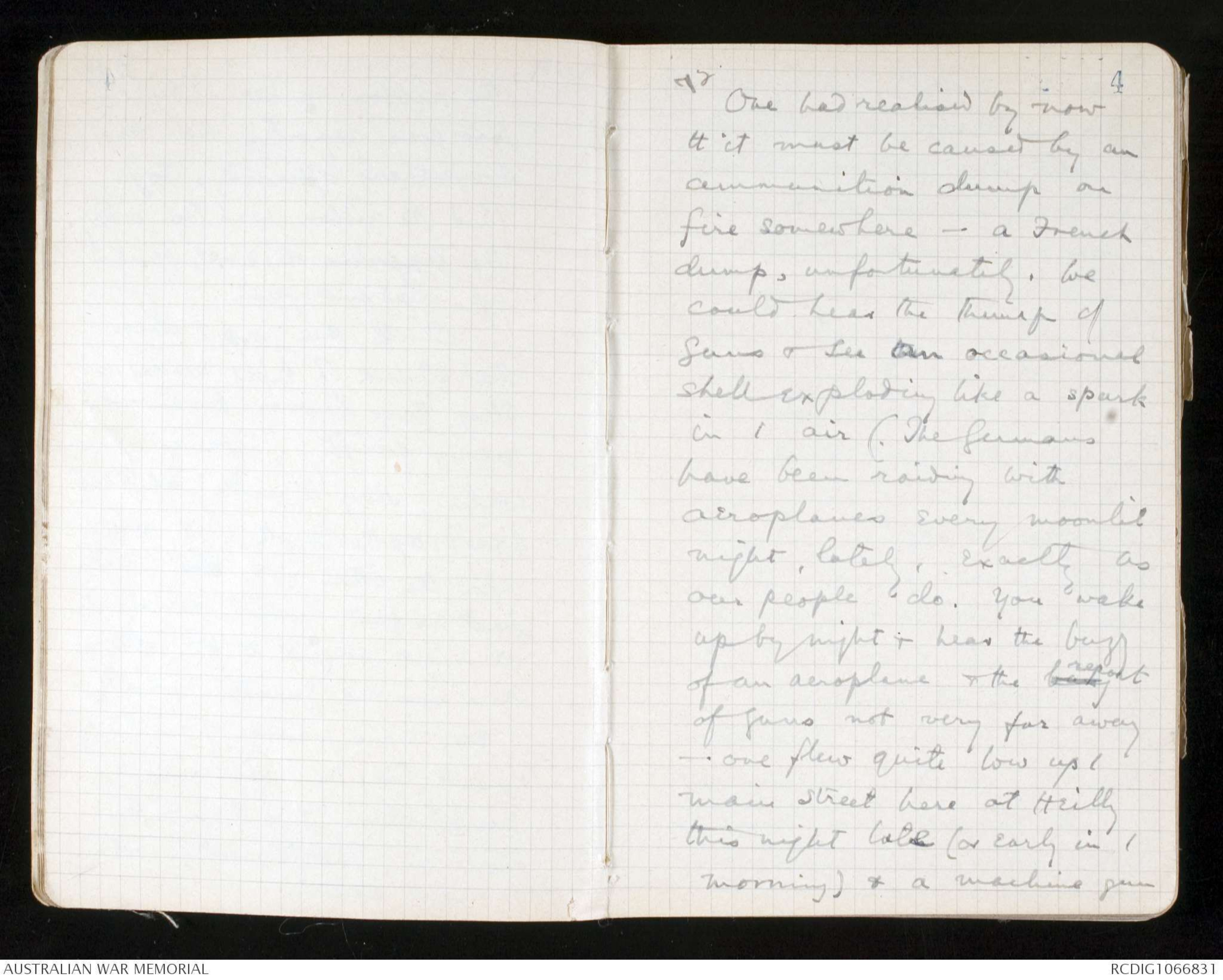
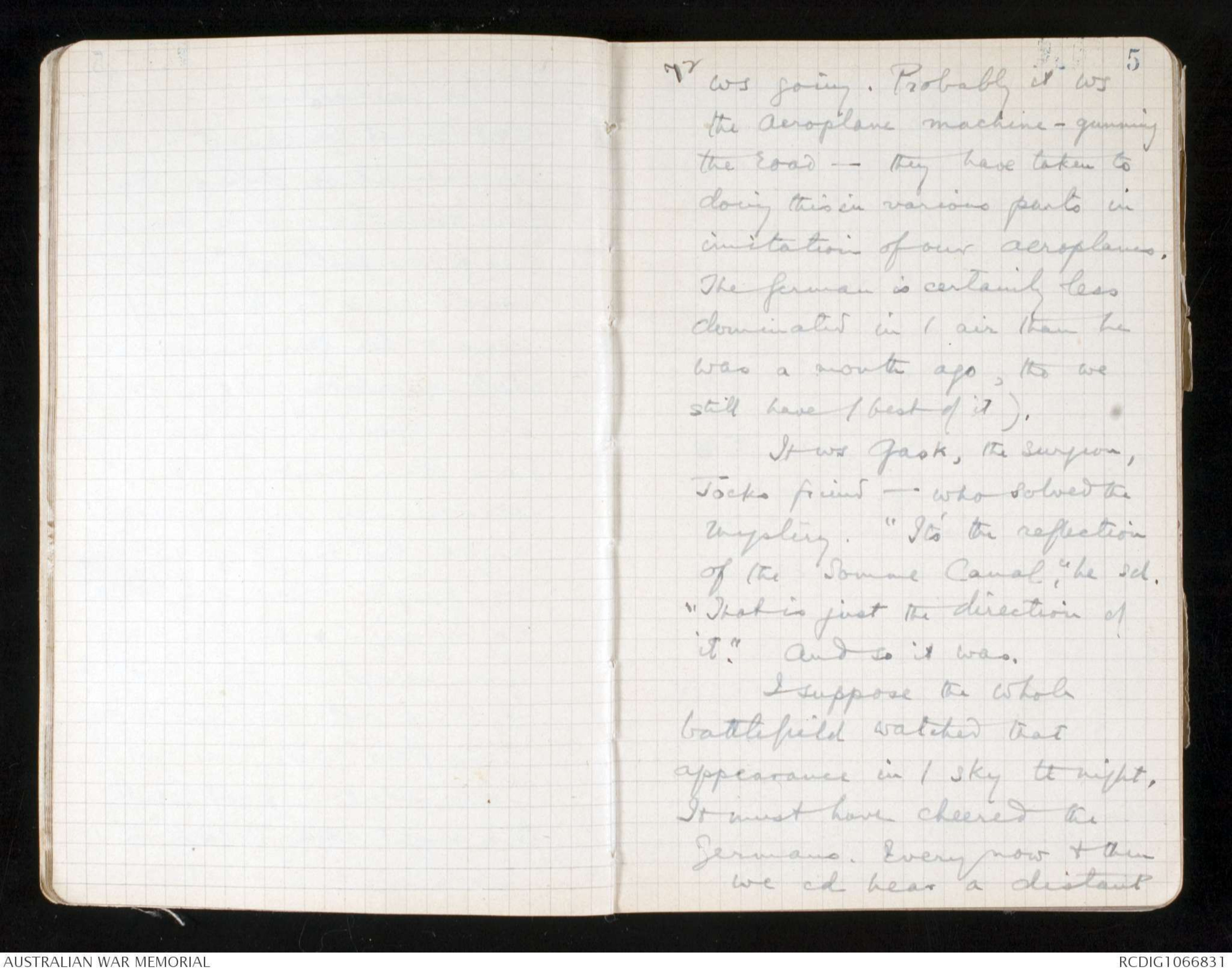
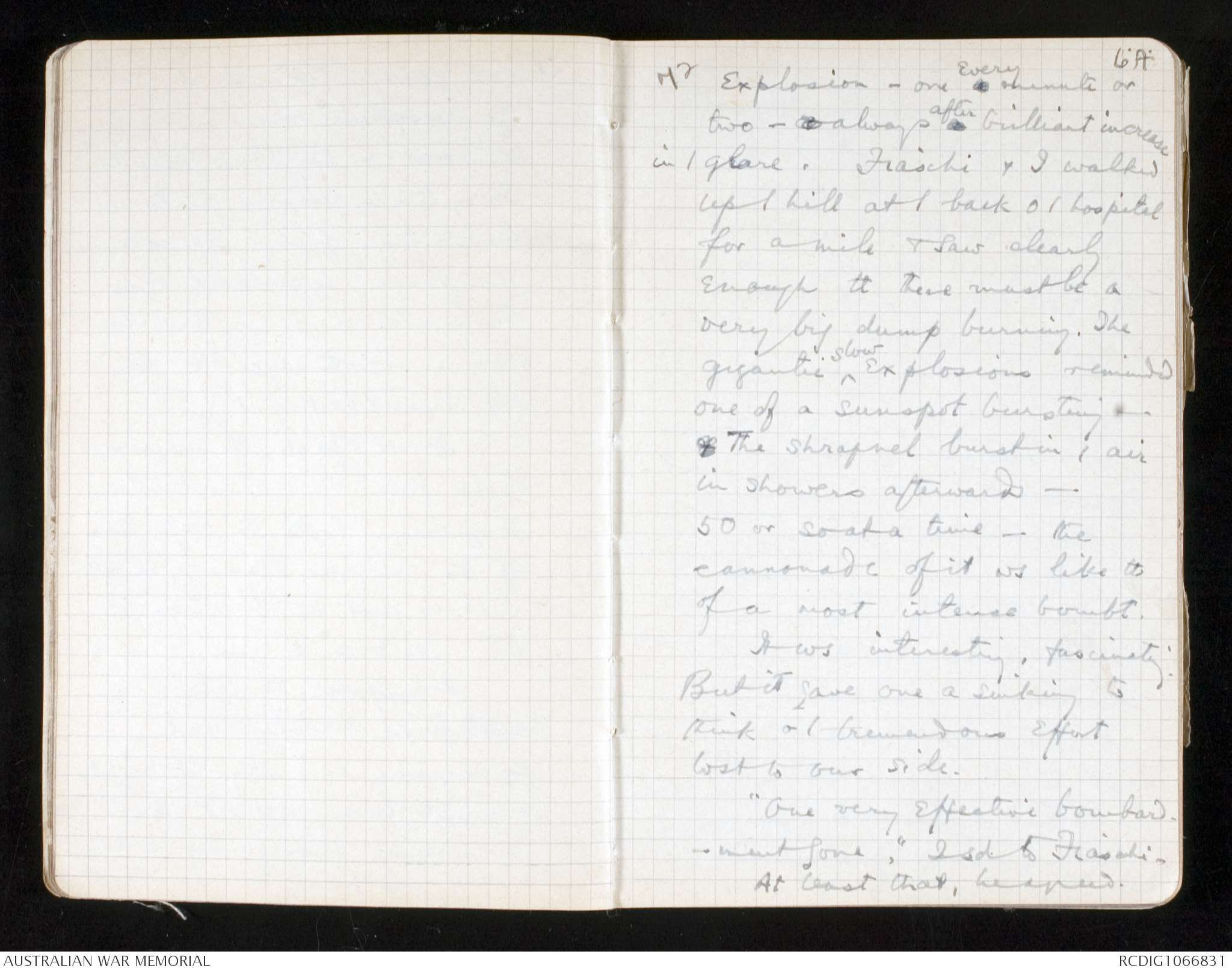
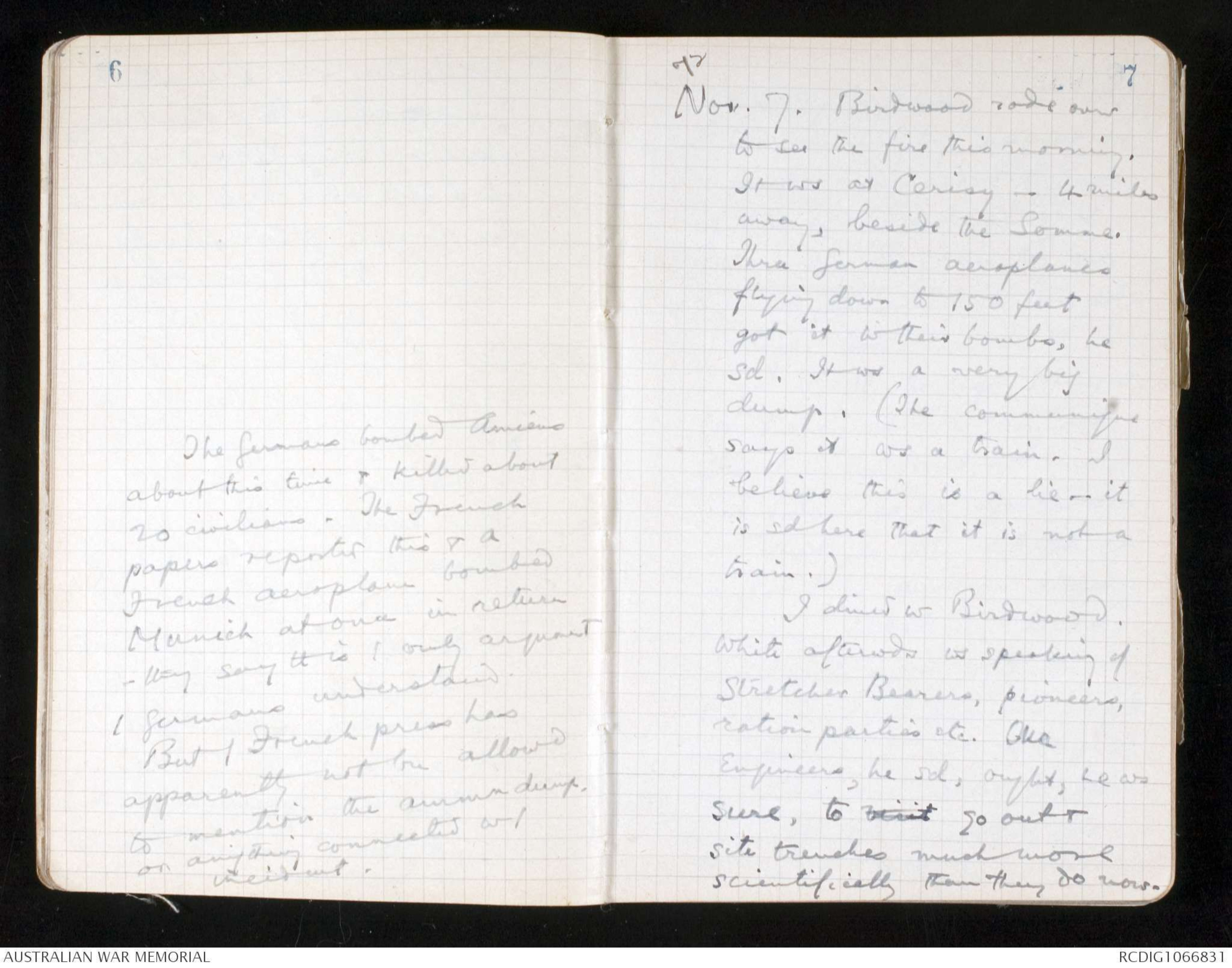
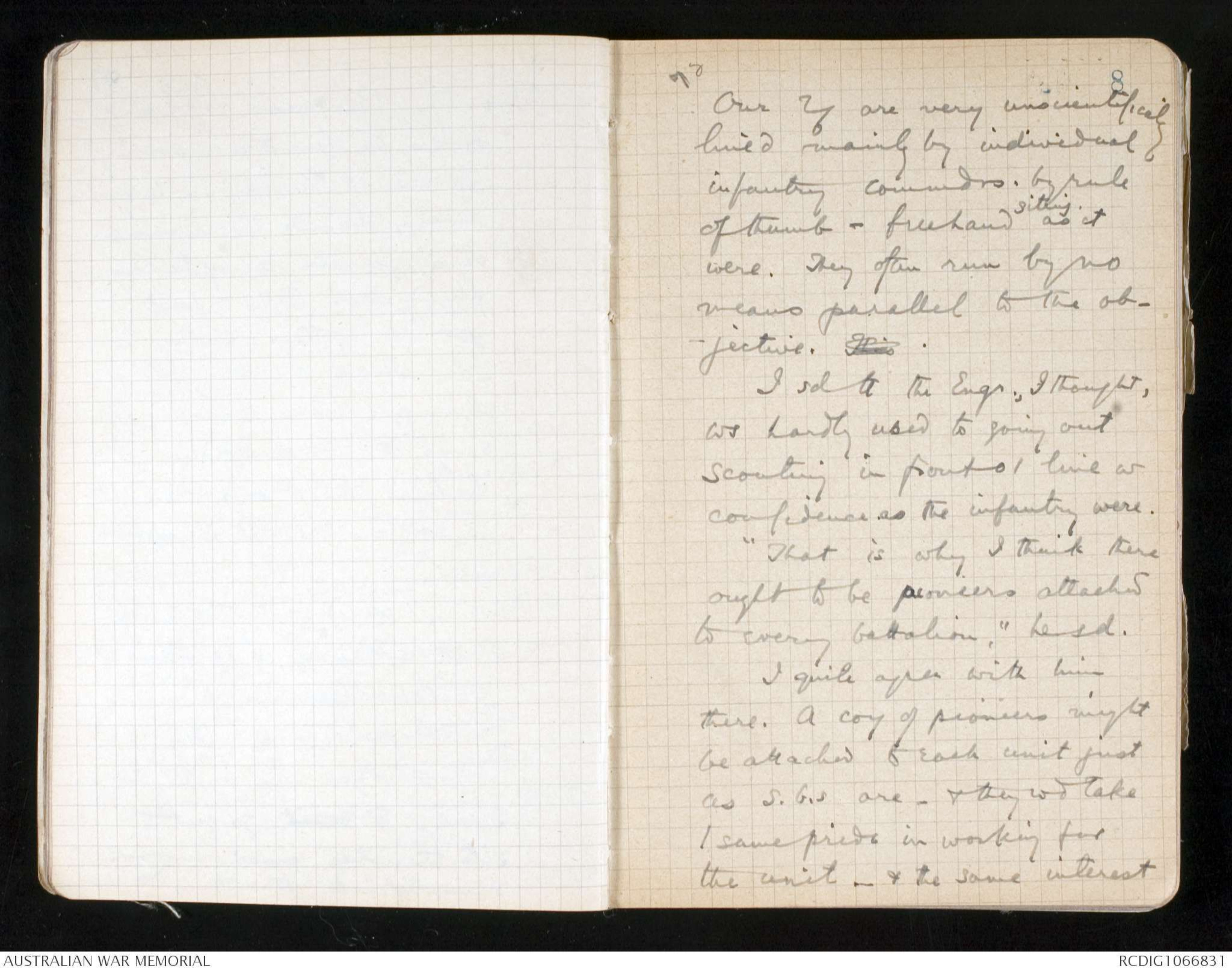
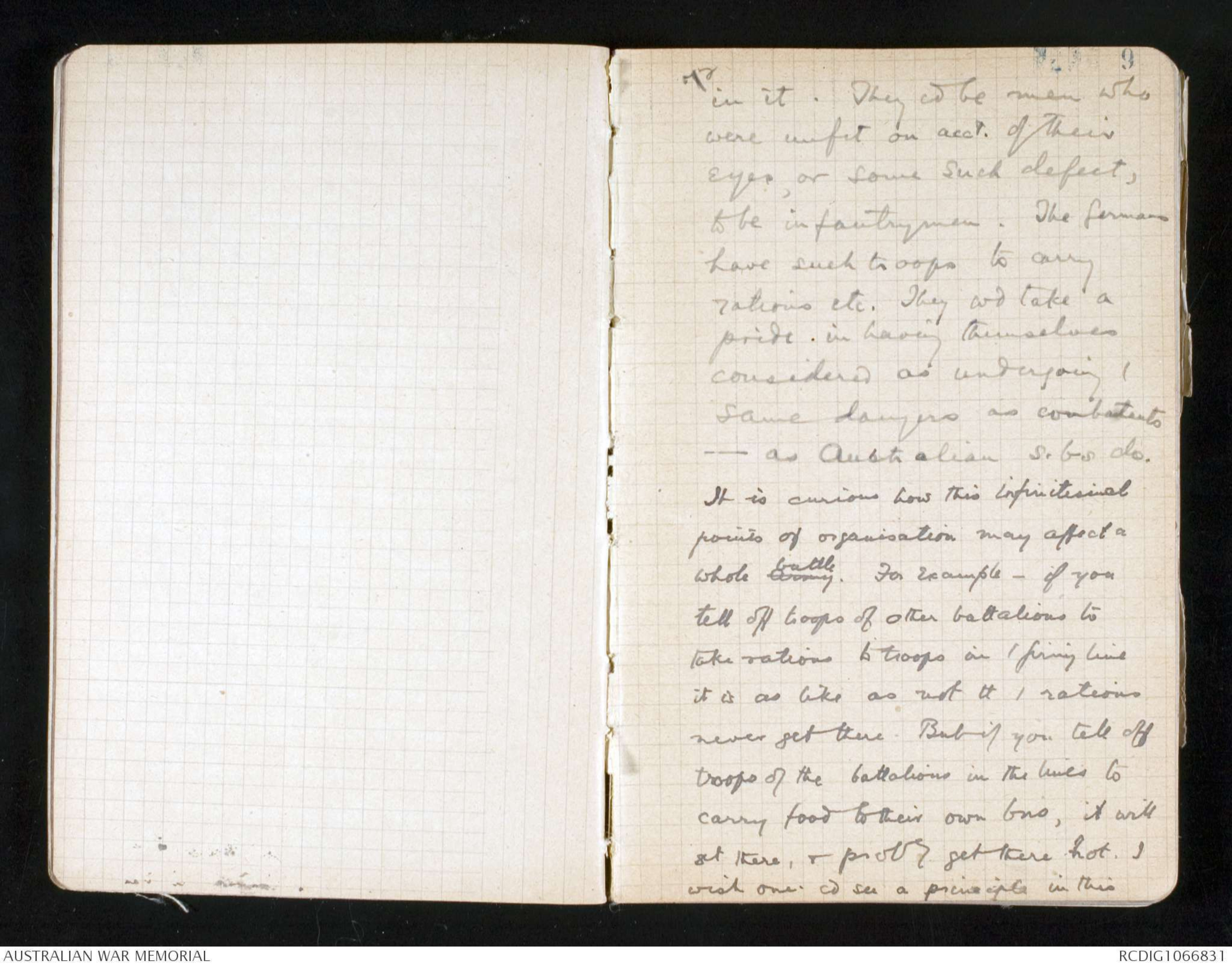
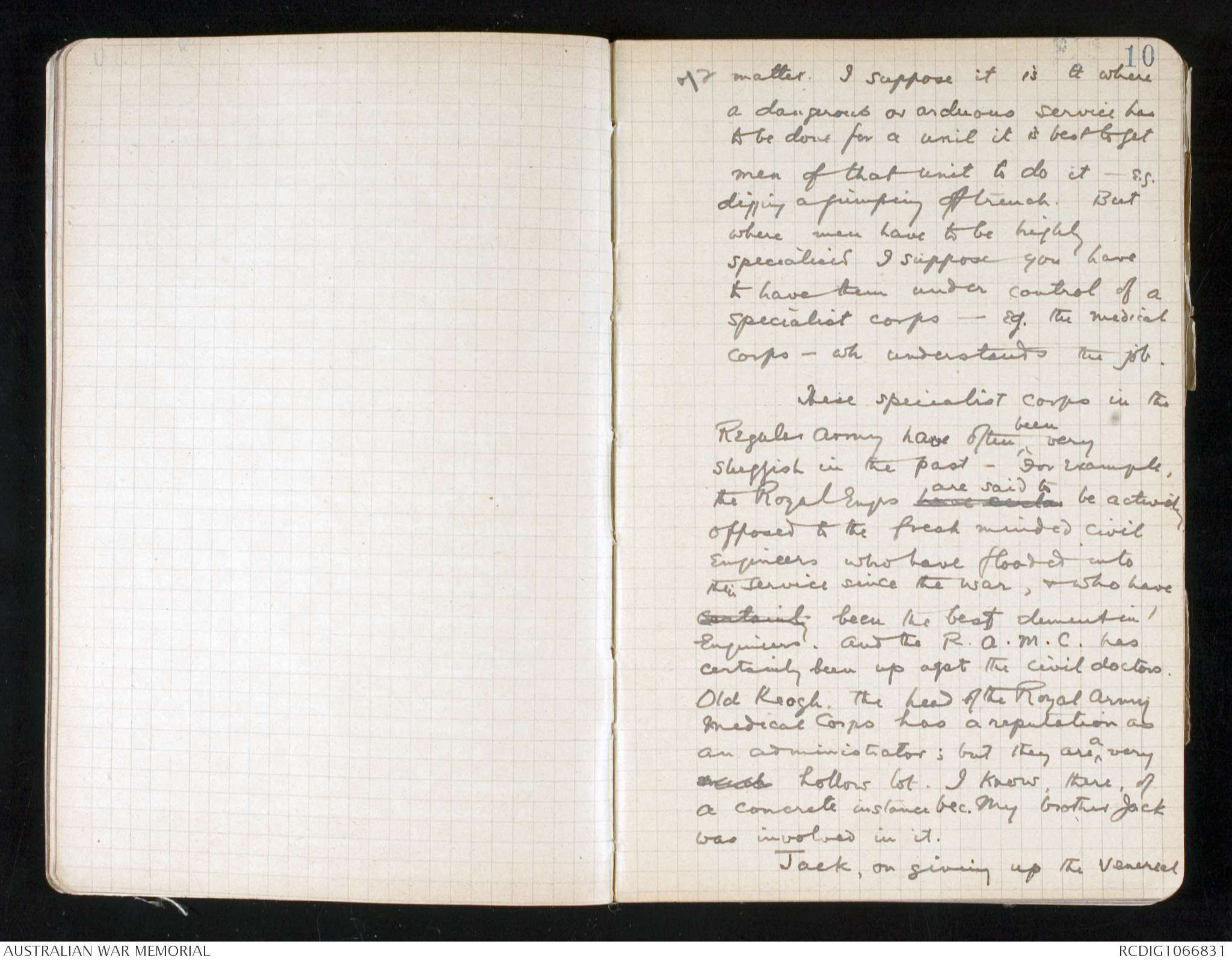
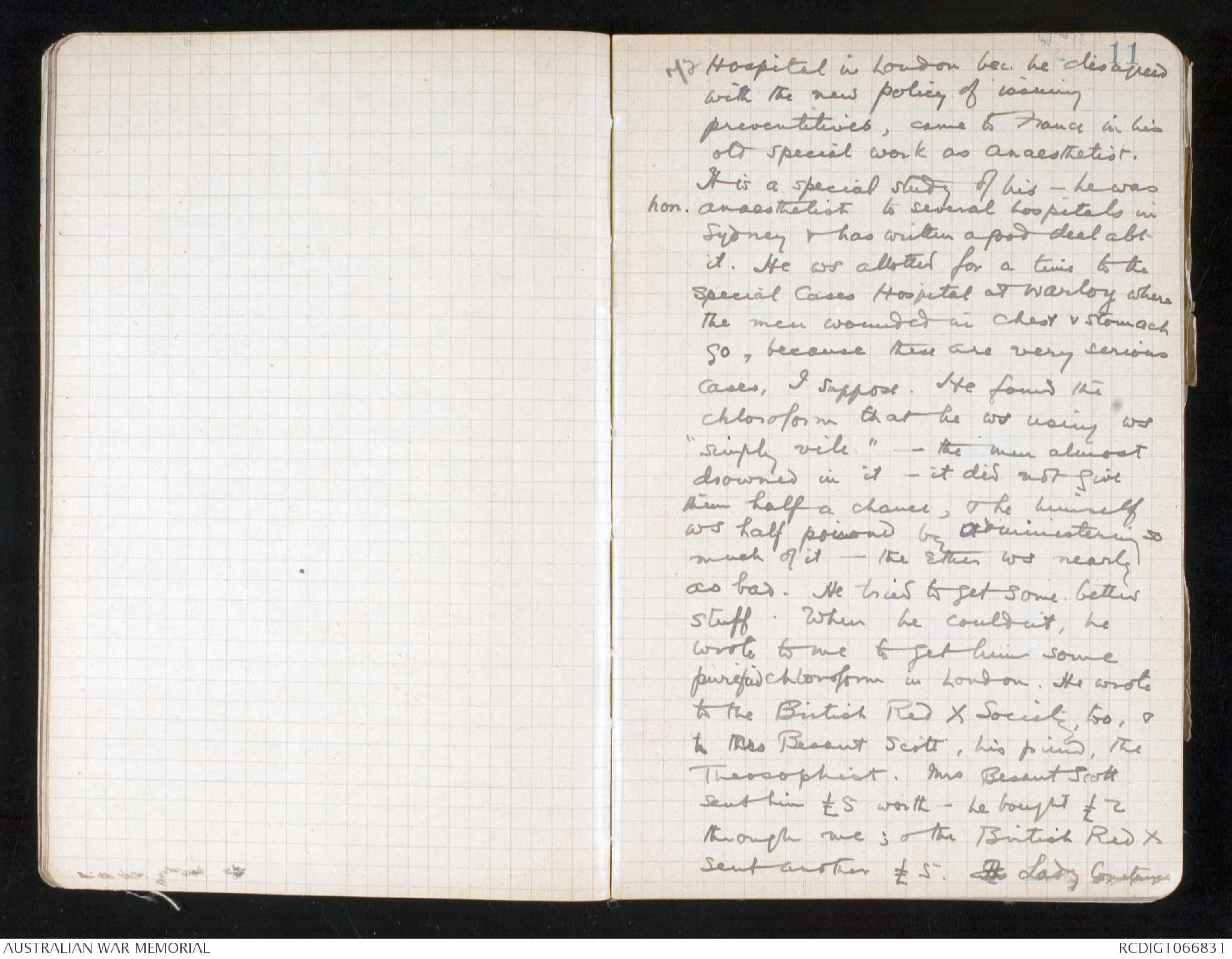
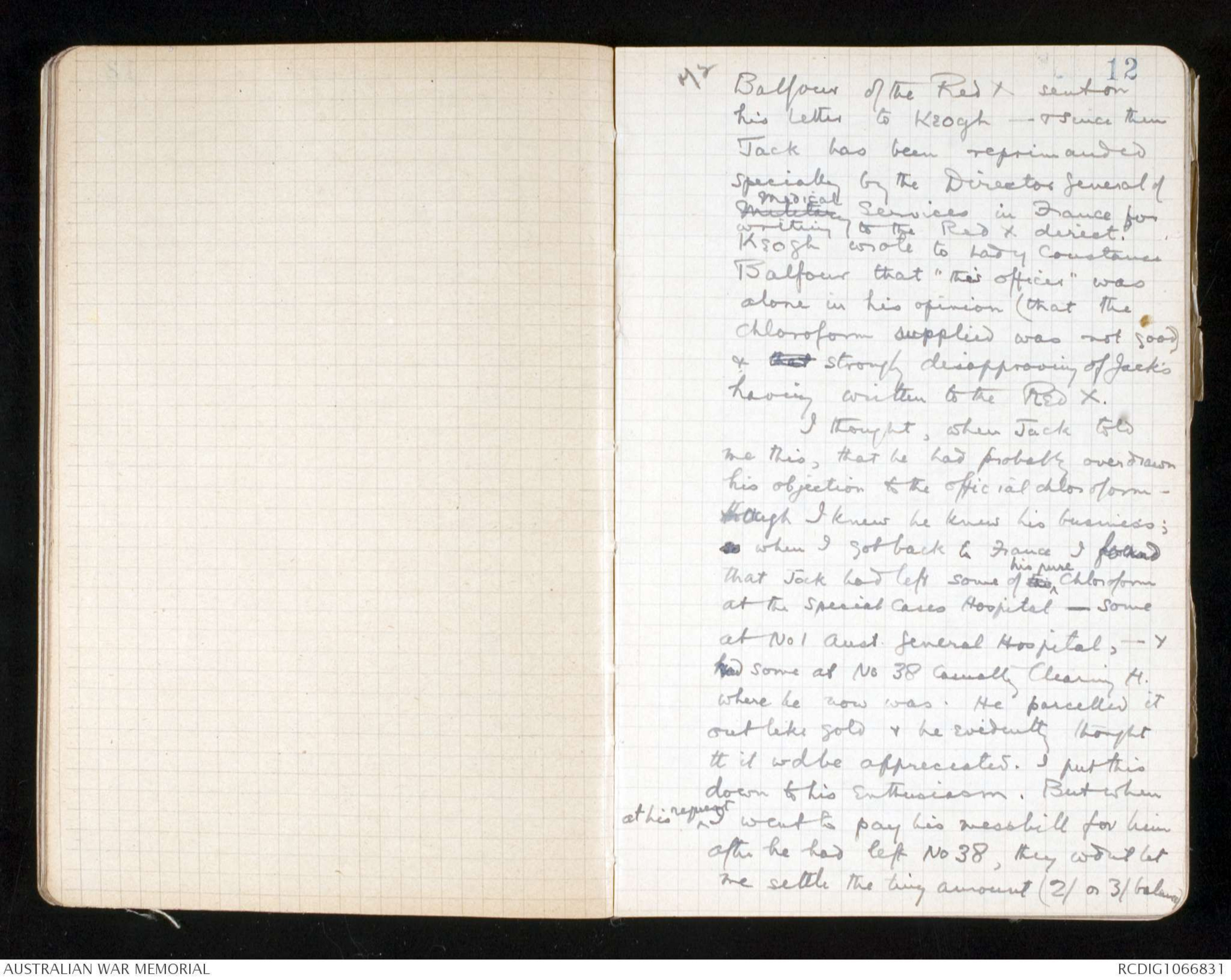
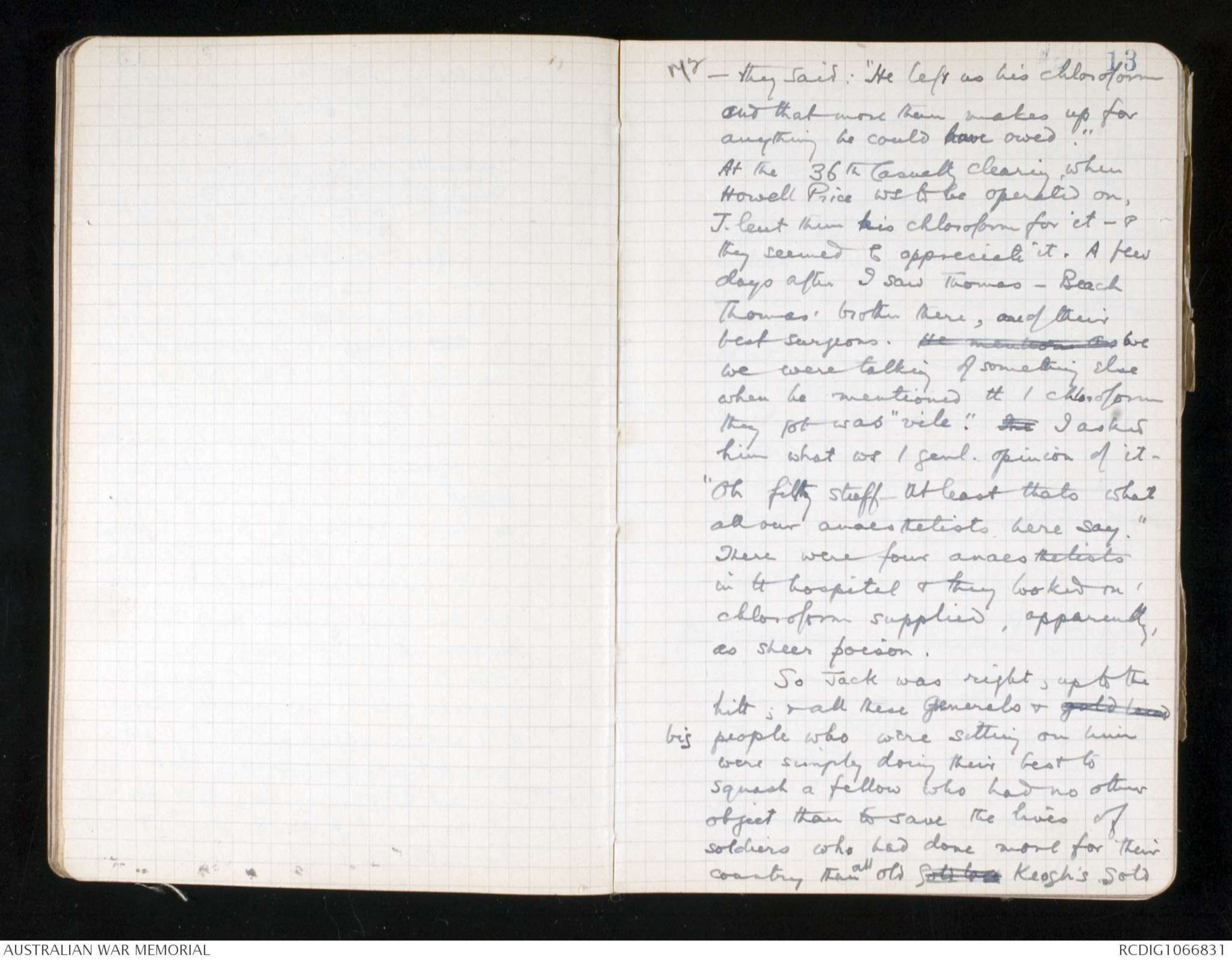
72 4
One had realised by now
tt it must be caused by an
ammunition dump on
fire somewhere - a French
dump, unfortunately. We
could hear the thump of
guns & see an occasional
shell exploding like a spark
in / air. (The Germans
have been raiding with
aeroplanes every moonlit
night, lately, exactly as
our people do. You wake
up by night & hear the buzz
of an aeroplane & the bang report
of guns not very far away
- one flew quite low up /
main street here at Heilly
this night late (or early in /
morning) & a machine gun
72 5
ws going. Probably it ws
the aeroplane machine-gunning
the road - they have taken to
doing this in various parts in
imitation of our aeroplanes.
The German is certainly less
dominated in / air than he
was a month ago, tho we
still have / best of it).
It ws Gask, the surgeon
Jocks friend - who solved the
mystery. “Its the reflection
of the Somme Canal." he sd.
"That is just the direction of
it." And so it was.
I suppose the whole
battlefield watched that
appearance in / sky tt night.
It must have cheered the
Germans. Every now & then
we cd hear a distant
72 6'A'
Explosion - one a every minute or
two - & always x after brilliant increase
in / glare. Fiaschi & I walked
up / hill at / back o / hospital
for a mile & saw clearly
enough tt there must be a
very big dump burning. The
gigantic ^slow explosions reminded
one of a sunspot bursting -& The shrapnel burst in / air
in showers afterwards -
50 or or so at a time - the
cannonade of it ws like tt
of a most intense bombt.
It ws interesting ; fascinating.
But it gave one a sinking to
think of / tremendous effort
lost to our side.
"One very effective bombardment
gone," I sd to Fiaschi -
At least that, he agreed.
6
The Germans bombed Amiens
about this time & killed about
20 civilians. The French
papers reported this & a
French aeroplane bombed
Munich at once in return
- they say tt is / only argument
/ Germans understand.
But / French press has
apparently not bn allowed
to mention the ammn dump,
or anything connected w /
incident.
72 7
Nov. 7. Birdwood rode over
to see the fire this morning.
It ws at Cerisy - 4 miles
away, beside the Somme.
Three German aeroplanes
flying down to 150 feet
got it w their bombs, he
sd. It ws a very big
dump. (The communique
says it ws a train. I
believe this is a lie - it
is sd here that it is not a
train.)
I dined w Birdwood.
White afterwds ws speaking of
Stretcher Bearers, pioneers,
ration parties etc. Our
engineers, he sd, ought, he ws
sure, to visit go out &
site trenches much more
scientifically than they do now.
72 8
Our trenches are very unscientificaly
lined mainly by individual
infantry commdrs. by rule
of thumb - freehand siting as it
were. They often run by no
means parallel to the objective.This.
I sd tt the Engr., I thought,
ws hardly used to going out
scouting in front o / line w
confidence as the infantry were.
"That is why I think there
ought to be pioneers attached
to every battalion," he sd.
I quite agree with him
there. A coy of pioneers might
be attached to each unit just
as s.b.s are - & they wd take
/ same pride in working for
the unit - & the same interest
72 9
in it. They cd be men who
were unfit on acct. of their
eyes, or some such defect,
to be infantrymen. The Germans
have such troops to carry
rations etc. Thy wd take a
pride in having themselves
considered as undergoing /
same dangers as combatants
- as Australian s.bs do.
It is curious how this infinitesimal
points of organisation may affect a
whole army battle. For example - if you
tell off troops of other battalions to
take rations to troops in / firing line
it is as like as not tt / rations
never get there. But if you tell off
troops of the battalions in the lines to
carry food to their own bns, it will
get there, & probly get there hot. I
wish one cd see a principle in this
72 10
matter. I suppose it is tt where
a dangerous or arduous service has
to be done for a unit it is best to get
men of that unit to do it - e.g.
digging a jumping off trench. But
where men have to be highly
specialised I suppose you have
to have them under control of a
specialist corps - e.g. the medical
corps - wh understands the job.
These specialist corps in the
Regular Army have often ^been very
sluggish in the past - For example,
The Royal Engrs have certa are said to be actively
opposed to the fresh minded civil
engineers who have flooded into
their service since the war, & who havecertainly been the best element in /
Engineers. and the R.A.M.C. has
certainly been up agst the civil doctors.
Old Keogh. the head of the Royal Army
Medical Corps has a reputation as
an administrator; but they are ^a verymuch hollow lot. I know, there, of
a concrete instance bec. My brother Jack
was involved in it.
Jack, on giving up the Venereal
72 11
Hospital in London bec. he disagreed
with the new policy of issuing
preventitives, came to France in his
old special work as anaesthetist.
It is a special study of his - he was
hon. anaesthetist to several hospitals in
Sydney & has written a good deal abt
it. He ws allotted for a time to the
Special Cases Hospital at Warloy where
the men wounded in chest & stomach
go, because these are very serious
cases, I suppose. He found the
chloroform that he ws using ws
"simply vile" - the men almost
drowned in it - it did not give
him half a chance, & he himself
ws half poisoned by administering so
much of it - the ether ws nearly
as bad. He tried to get some better
stuff. When he couldn't, he
wrote to me to get him some
purified chloroform in London. He wrote
to the British Red X Society, too, &
to Mrs Besant Scott, his friend, the
Theosophist. Mrs Besant Scott
sent him £5 worth - he bought £2
through me; & the British Red X
sent another £5. The Lady Constance
72 12
Balfour of the Red X sent on
his letter to Keogh & since then
Jack has been reprimanded
specially by the Director General ofMilitary Medical Services in France for
writing to the Red X direct.
Keogh wrote to Lady Constance
Balfour that “this officer” was
alone in his opinion (that the
cloroform supplied was not good)
& that strongly disapproving of Jack’s
having written to the Red X.
I thought, when Jack told
me this, that he had probably overdrawn
his objection to the official chloroform -
though I knew he knew his business;so when I got back to France I found
that Jack had left some of this ^his pure chloroform
at the Special Cases Hospital - some
at No 1 Aust General Hospital - &
had some at No 38 Casualty Clearing H.
where he now was. He parcelled it
out like gold & he evidently thought
tt it would be appreciated. I put this
down to his enthusiasm. But when
at his ^request I went to pay his mess bill for him
after he had left No 38, they wdnt let
me settle the tiny amount ( 2/ or 3/ balance)
72 13
they said: "He left us his chloroform
and that more than makes up for
anything he could have owed."
At the 36th Casualty Clearing, when
Howell Price ws to be operated on,
J. lent him his chloroform for it - &
they seemed to appreciate it. A few
days after I saw Thomas - Beach
Thomas’ brother there, one of their
best surgeons. He mentioned that we
we were talking of something else
when he mentioned tt / chloroform
they got was “vile”. The I asked
him what ws / genl opinion of it -
“Oh filthy stuff. At least thats what
all our anaesthetists here say.”
There were four anaesthetists
in tt hospital & they looked on /
chloroform supplied, apparently,
as sheer poison.
So Jack was right, up to the
hilt & all these Generals & gold laced
big people who were sitting on him
were simply doing their best to
squash a fellow who had no other
object than to save the lives of
soldiers who had done more for their
country than all old gold lace Keogh's gold
 Lulu B
Lulu BThis transcription item is now locked to you for editing. To release the lock either Save your changes or Cancel.
This lock will be automatically released after 60 minutes of inactivity.